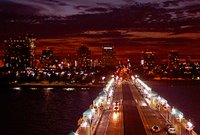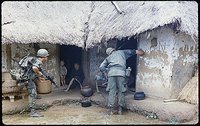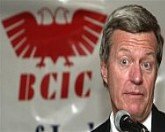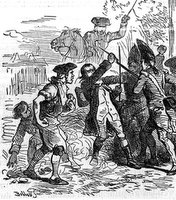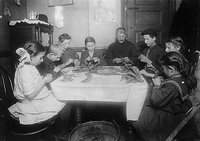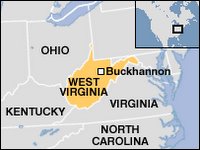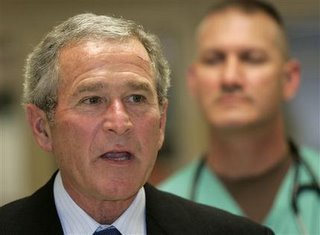
Corroborative Damage
On September 12, 2001 the United States stood at a turning point. On the previous day our people confronted one of the most dreadful disasters in our nation’s history. We were brutally attacked by Islamic Extremist terrorist; we lost 2,986 of our citizens in the merciless massacre, as well as a piece of our Nation’s soul. The World Trade Center, an American symbol of prosperity crumbled after two jet airplanes collided with each building. The Pentagon, our Nations military command center, was nearly destroyed and American Airlines flight 93, thanks to a handful of brave passengers, crashed in rural Pennsylvania before reaching its target.
The US was in a state of shock. Forlorn of hope, the repeated question became,
” how could this happen to us?” An inquiry which led to only more questions. As the answers began to surface our shock turned to anger and our anger developed a steady focus – Osama Bin Laden.
Bin Laden, a staunch enemy of American Democracy, was the master mind behind the 9/11 tragedy. The Bush Whitehouse, until then perceived as weak administration, found it's voice then comforted a troubled people. Soon after, the dust settled and our Nation moved in unison toward a reslove.
Our goal : to find and and destroy Al Qeada. Our target: Afghanistan.
The Afghani government, otherwise known as The Taliban, were gangsters in their own right. The Taliban was an oppressive regime whose goal it was to push their distorted view of Islam on the people of the world. They were hiding Osama Bin Laden and his like minded Militia. The Taliban were uncooperative; they would not answer our demands to turn over Al Qaeda or Bin Laden. Naturally we invaded their broken, collapsed country and hunted our mortal enemy.
I had some reservations about invading another country to catch Bin Laden, but it seemed as though we could do some good for Afghanistan and her people. It wasn’t a hard sell to the American public to invade Afghanastan. After all, the Taliban protected Bin Laden, they were brutal theocrats, they had a horrible human rights record, and they despised the USA. Additionally Afghanastan had once been a moderate country before decades of war crumbled its infrasturcture and her demoralized her citizens. There was hope for Democracy in all of that rubble. Not to mentions that the world would be a better place without the Taliban. Finally, we had an opportunity to further Democracy in a region of the world where Democracy is a foreign concept and dictators flourish. This was a well justified invasion.
The action seemed to go well, as well as can be expected. We were making headway with “bunker buster” bombs and our Special Forces teams were building successful coalitions with the tribal rulers. Predictably, the media had mixed reviews about our progress, but most of the soldiers were optimistic – news from the front is good enough for me.
Not long after the invasion however clarity struck with the potency of a clamore. The reality of our efforts settled in. Our mission was not going to be easy. Bin Laden had escaped.
The Afghani regions were quagmired in tribal feuds. The leader of the Northern alliance, Ahmad Shah Masood, our hope for a moderate government, was killed in action. Our forces had only managed to secure Kabul, the capital city, the rest of the region was wild and untamed.
At this point I thought that our government would begin utilizing all of our available resources to catch Al Qaeda and rebuild Afghanastan. Much like the Isralis hunted and captured the escaped Nazi's; the FBI, NSA and CIA should have formed a joint task force to catch the criminals responsible for the WTC tragedy, then kill them or bring them to justice. However, our government, specifically the Bush Administration, had an expanded agenda. The White House began to focus on toppling Sadam Husain’s government: destination Iraq.
The Bush Administration framed a convincing argument for a war against Iraq. The American people were told that the Iraqi government harbored and aided Al Qaeda, and that Iraq had Weapons of Mass Destruction. We were also led the believe that an Iraqi sanctioned attack on U.S. soil was insuppressible. The argument was convincing, especially as Colin Powel address the U.N. Security Council and the world with these revelations. It wasn't until later that we learned the claims of eminent danger from Iraq were artificial and our consent was manufactured.
But the United States had been seriously wounded and she was ready to strike back with all of her might. There were plenty of assurances that we were doing the right thing by going after Iraq, the media was on board, millions of Americans were with the President. In fact many who spoke against the war faced harsh disapprovment , and were alienated. But there was some effective resistance. Scott Ridder, former UN weapons inspector insisted that Saddam did not have any Weapons of Mass Destruction. He turned out to be right. There is no significant evidence of WMD’s. Also there are no substantial Iraqi ties to al Qaeda. The evidence for this point is growing clearer each day. It's also fair to say that the UN Sanctions which were establihsed to eleminate the Iraqi threat and broadly criticized by the Bush Administration were working. Iraq posed no immediate threat to the United States and lacked the capability to build and facilitate Weapons of Mass Destruction.
Soon after we invaded Iraq, it became obvious to me that conventional warfare was not an efficient way to catch Al Qaeda, nor is it an efficient means of stopping terrorism. We have not met our objectives in Afghanistan (the other war), nor are we any closer to catching Osama Bin Ladin and Al Qaeda. In fact, terrorsim has been on the rise since we invaded Iraq. Perhaps this is why the Bush Administration is no longer publishing the the world terrorist activity reports. Perhaps our agenda for toppling Sadam Husain is enhanced by our need for crude oil or our need to expand our trade markets. The White House is unwilling to discuss these possible motives, so we are left to speculate. It is becoming increasingly difficult to deny that the case for war in Iraq was weak and that it has been a gross misallocation of our soldiers and resources. Whether or not the White House intentionally lied to the American people, which I think they did, is beyond the scope of this post, but it is a question worth asking - maybe a later post.
Ultimately these men, Al Qaeda, are criminals and should be treated as criminals. Using our entire military to eleminate world terrorism is precisely the response that they, the ememy, expected. We played into their hands and now we've become the aggressors. Additionally, by declaring war on Iraq we have lost focus on the War On Terror and our efforts to rebuild Afghanastan. We have invaded a country, Iraq, which was number five on the list of most dangerous nations, our presence in Iraq has created a terrorist insurgence where there once was none, we still have not captured Osama Bin Laden, we have already spent over 230 billion dollars on the invasion and attempts to rebuild, we have lost over 2200 of our brightest and best citizen soldiers, and we have turned much of the Muslim world against us.
There are also hidden costs of this war, such as the effects of Depleted Uranium on soldiers and civilians, and Post Traumatic Stress Disorder from returning soldiers. The side effects of these elements can never be fully calculated, but are likely to emenate and linger with our society for decades. Using conventional warfare to win the War on Terror has put the American people in more danger than before the Iraq invasion and our methods are proving to be as efficient as hunting a group of misquotes with an elephant gun.
